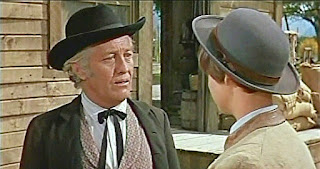'Tis the season to take it easy, to get together with like-minded folks and enjoy a bit of cheer. Even hard-boiled fellas like Philip Marlowe need to kick back every once in a while.
1947s Lady in the Lake is based on Raymond Chandler's novel with a screenplay by Steve Fisher (I Wake Up Screaming, Susan Slept Here, Dead Reckoning, Song of the Thin Man).
Lady in the Lake was the first official directorial credit for actor Robert Montgomery. Oscar-winning cinematographer for Battleground, Paul Vogel assists in creating the moody, noirish atmosphere. Other of his crime pictures include High Wall, Black Hand, and The Tall Target.
Allowed to cut loose on the project, Montgomery decided to shoot the film through the subjective eye of the camera and his character. It's certainly the correct project for such an approach as part of the fun of Chandler's work is the running commentary provided by Philip Marlowe as the reader tags along on another of his ventures into a society of the depraved and the misleading.
We get an opening shot of Montgomery/Marlowe inviting us to hear of his latest case and establishing his look before we are off to the races. Things happen quickly for Marlowe. He gets a case. He gets knocked around. Everybody wants him off the case. He won't back down because now he's mad or ... maybe he's fallen for some skirt. That's the other thing about Marlowe, he may have been kicked around and should know better, but he wears his heart on his sleeve.
In this case, the gal is his latest client. Her name is Adrienne Fromsett and she's played by one of film noir's greatest and favourite actresses, Audrey Totter. Miss Fromsett has been kicked around by life and does not, most definitely not, wear her heart on her sleeve. She hires Marlowe to find her publisher boss's wife so he will be free to divorce her and move on. Things, of course, get complicated with gigolo boyfriends, unfriendly cops, crazy women with guns, and with Adrienne.
All of these complications are set to the background of the Christmas season with office parties and Christmas trees and carol singing. Is it the time of year, the brush off from the boss, or his own unique charms that have the steely Miss Fromsett falling for our guy?
The subjective camera takes a little getting used to. The first time I saw this film years ago I found it distracting and almost annoying. Later on, I sat back and enjoyed the off-beat rhythm it created. After all, life isn't a play with all the characters in neat groupings. When people look at us what exactly do they see?
The cast is rounded out by Leon Ames as the publisher, Dick Simmons in a fun turn as the gigolo, Jayne Meadows as a mysterious flirt, and Tom Tully and Lloyd Nolan as a couple of small-town cops.
Montgomery includes a raucous car chase supported by a choral music background. He would use voices again in the score for his 1960 film The Gallant Hours.
In the midst of the whirlwind that is Marlowe's Christmas week, he and Adrienne do have some downtime. Christmas morning is spent with Marlowe recuperating from injuries while they share life stories and listen to a radio broadcast of A Christmas Carol. Private Eyes are people too, you know.
A lot of movies, especially detective movies, are like a lot of other movies and that is part of their charm. Lady in the Lake tries to be just a little bit different and that is part of its charm. It has made its way into my perennial holiday must-watch list. Such a persistent fellow that Marlowe.


























































